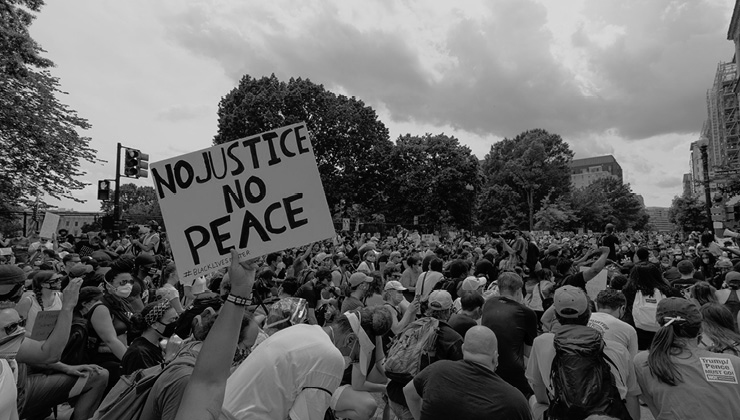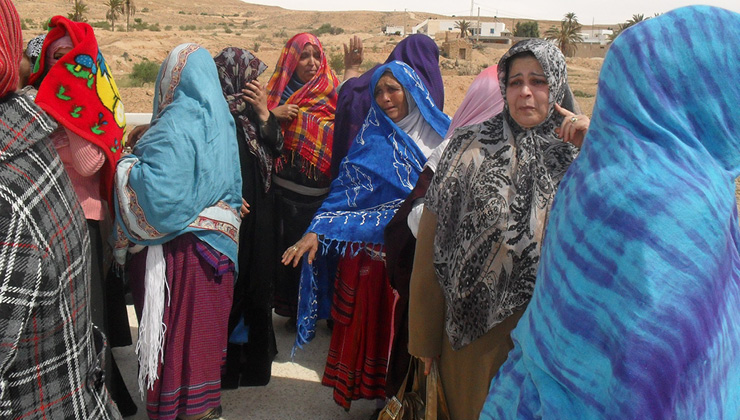Olivia Storz explores the ways in which political rhetoric during the 2016 US presidential election impacted intimate partner violence and highlights the opportunities for women, peace and security scholars to explore the relationship between elections and everyday violence in peacetime.
Content warning: This post discusses experiences with IPV and law enforcement.
Due to the scholarly work of the Women Peace and Security (WPS) Agenda, we know that war, climate change, pandemics, exposure to human rights violations, and economic instability impact intimate partner violence (IPV). Existing case studies in conflict zones demonstrate that IPV is responsive to political tension. For example, UN Women focuses on IPV shelters as an early warning indicator for rising conflict. However, this framework has not been applied to non-conflict zones. Yet, conflict is deeply connected to everyday lives and a curiosity about the ways that violence is impacted by political tension in ‘peacetime’ extends the potential of the WPS agenda.
In October of 2016, Donald J. Trump’s recorded words “You can do anything. Grab em’ by the pussy. You can do anything,” were widely released. This tape served as a prescient example of a candidate and then President who consistently deployed a “you can do anything” political and rhetorical framework. His capricious approach during the election had wide-reaching impacts, many of which have been broadly researched. A lab experiment in 2016 found that men acted more aggressively towards women. Thanksgiving family dinners were shortened due to political tension. Heart attacks increased due to the stress of the election and married couples were arguing more often. The Center for American Women and Politics found that married women reported that their husbands pressed them to vote for Trump. Despite the clear impact of the election, the effect of 2016 on intimate partner violence (IPV) has not yet been researched. I conducted extended interviews about the election with Directors of IPV shelters in five US states, Michigan, Iowa, North Carolina, Florida, and Indiana, in June of 2021.
Those working with survivors of IPV described the impact of Trump and the 2016 election as enduring and shockingly violent. One Executive Director of a shelter in Indiana said, “I think the 2016 election, and the outcomes of that election, traumatized women across the nation, […] and empowered and emboldened offenders.” In North Carolina, multiple cases were discussed in which protection orders were violated by offenders specifically referencing Trump. In Indiana, “offenders were sending Trump’s tweets to victims, and violating protective orders and threatening them.” Another interview participant corroborated the haunting nature of Trump’s rhetoric noting “We have had many offenders quote Trump, in their abuse towards their intimate partners […] Offenders in police reports say ‘Well, our president says this. So, this gives me the right to do this. […] the whole grab her by the pussy thing, that has been quoted in sexual assault cases. It is in police reports.” Multiple research participants noted that President Trump reminded survivors of their abuser.
Those working with survivors of IPV described the impact of Trump and the 2016 election as enduring and shockingly violent.
Shelter workers described a cataclysmic change in their jobs following the 2016 election. This impact was described as part of a continuum; “on the micro-level, the misogyny allows perpetration, and on the macro level, Trump’s election is indicative that we’re okay with it.” In Iowa, “former President Trump broke all the norms. So when things stopped working, when they stop even the idea of civility, the most vulnerable are hurt the most. And that is particularly domestic violence survivors.” Shelter workers argued that the “you can do anything” framework was used to justify everyday violence. Trump’s rhetoric did not remain commentary but rather metastasized from the campaign trail to a police report. As the Executive Director of a shelter in Michigan explained, “we are the first casualty of the political crisis.”
“on the micro-level, the misogyny allows perpetration, and on the macro level, Trump’s election is indicative that we're okay with it.”
What might intimate partner violence tell you about the state of democracy? Conceptions of power-sharing, and accountability matter in the home and the White House. For example, on January 6th, 2021, Larry Rendall Brock Jr. stormed the United States Capitol Building wearing full combat gear. His ex-wife had called the police multiple times in 2016 for making what police reports described as a “terroristic threat of family” and raving about the election. To fully understand political crises like January 6th, both extreme and everyday violence must be understood as important areas of political inquiry.
Feminist scholars remind us that the “mundane matters.” Methodologies focused on our quotidian lives shift empirical attention from the conflict-zone to the IPV shelter, offering multi-faceted insights into how politics are lived. Academics focused on elections have not trained their epistemological gaze to IPV, highlighting an important research gap. We currently lack sufficiently rich data on rates and fluctuations of IPV in the United States to fully evaluate this relationship at scale. The political is personal– to understand elections and political crisis we must also investigate how ordinary lives are shaped by the contours of power. This connection should be investigated further, asking new questions of the Women, Peace, and Security agenda. The contingencies of ‘peace’ and the limits of security may reveal the structurally radical possibilities of the WPS agenda.
The views, thoughts and opinions expressed in this blog post are those of the author(s) only, and do not necessarily reflect LSE’s or those of the LSE Centre for Women, Peace and Security.





